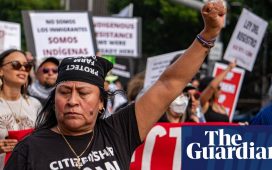The trauma Donald Trump’s administration caused to young children and parents separated at the US-Mexico border constitutes torture, according to evaluations of 26 children and adults by the group Physicians for Human Rights (PHR).
The not-for-profit group’s report provides the first in-depth look at the psychological impact of family separation, which the US government continued despite warnings from the nation’s top medical bodies.
“As a clinician, nobody was prepared for this to happen on our soil,” the report co-author Dr Ranit Mishori, senior medical adviser at PHR, told the Guardian. “It is beyond shocking that this could happen in the United States, by Americans, at the instruction and direct intention of US government officials.”
Legal experts have argued family separation constituted torture, but this is the first time a medical group has reached the determination.
PHR volunteer psychiatrists evaluated 17 adults and nine children who had been separated between 30 to 90 days. Most met the criteria for at least one mental health condition, including post-traumatic stress disorder, major depressive disorder or generalized anxiety disorder “consistent with, and likely linked to, the trauma of family separation”, according to the report.
Not only did the brutal family separation policy create trauma, it was intensified by the families’ previous exposure to violence on their journey to the US and in their home countries of Honduras, Guatemala and El Salvador.
All but two of the adults evaluated by PHR said they had received death threats in their home countries and 14 out of the 17 adults said they were targeted by drug cartels. All were fearful their child would be harmed or killed if they remained at home.
Almost all the children had been drugged, kidnapped, poisoned or threatened by gangs before they left. One mother told investigators she moved her daughter to different schools in El Salvador several times so gang members couldn’t find her and kill her.
In the face of these threats, parents tried to move within the country, change their phone numbers, meet extortion demands and go silent on social media. Ultimately, however, the report said: “Parents were confident that the journey to the United States would result in protection for their children.”
This is not what happened at the border.
The Trump administration instituted a policy in April 2018 that formally enabled the mass separation of children and parents at the US-Mexico border. Trump ended the policy in June 2018, but it has since been revealed that the administration separated thousands of families before and after the policy was in place.
There was also no system to reunite the families, according to an internal government watchdog. The Trump administration also ignored warnings from the nation’s leading medical organizations that family separation would traumatize children and adults.
People who experience trauma, especially as children, have higher rates of medical conditions such as cancer and cardiovascular disease. They also have an increased risk of psychiatric disorders and detrimental coping behaviors such as alcohol and drug abuse.
“Something like that does not just resolve once you’re reunified with your parents, it’s something you carry with you possibly forever,” Mishori said.
One Honduran father described how badly his son reacted the four times a psychologist came to their apartment for treatment in the report: “Each time the son would refuse to cooperate and would throw things at the therapist … It appears his son was afraid of strangers, afraid they will take him away from his father.”
Kathryn Hampton, a senior officer in PHR’s asylum program, said the group PHR had assessed was small but represented separated families from different detention centers and foster homes across the country over a two-year period.
“This is a really disparate group of people and yet their stories are practically identical,” said Hampton. “So that’s very disturbing, to see that level of consistency.”
Amid the despair, PHR has seen an outpouring of support in money and volunteers. Hampton said since the beginning of 2018, its Asylum Network had more than doubled to 1,700 clinicians who provide free medical and psychological evaluations to asylum seekers. There were also three times as many medical school clinics partnering with the organization in that period.
Dr Stuart Lustig, a California-based psychiatrist and longtime volunteer, evaluated a seven-year-old girl from Guatemala. He said when he and the girl did a common evaluation tool called the Squiggle Test, she had one of the more inhibited reactions he had seen in 20 years.
“These kinds of separations were filled with uncertainty, there was no information about where people are going, so it is not surprising at all that these separations ended up being extremely traumatizing for kids and parents,” Lustig said.
In November, a federal court ordered the US to compensate for the trauma separated families faced at the hands of the government. Lustig said there were many treatment options for children who experienced this deep level of trauma in the US, but he and PHR were concerned about how these families would have access to them.
Lustig said: “Part of the work is simply building trust in humanity again.”








